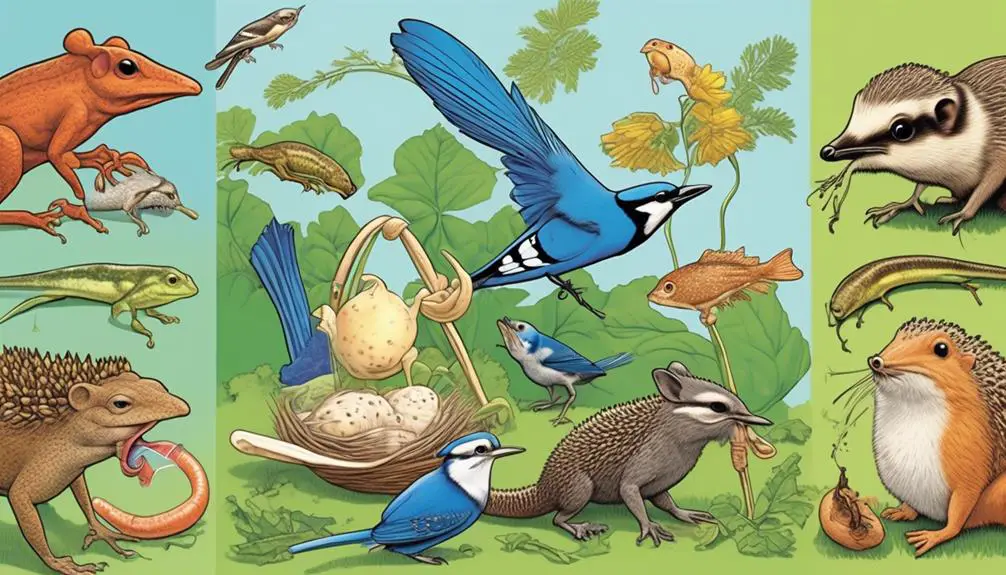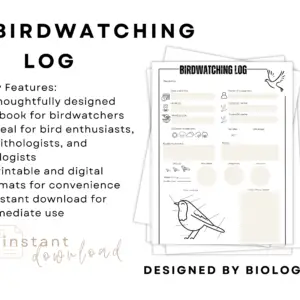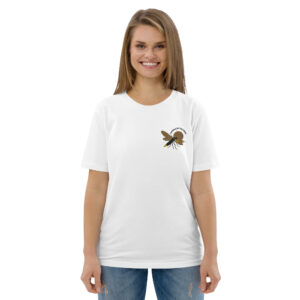Curious to know which animals rely on worms as a vital part of their diet? You might be surprised by the diverse range of creatures that have developed unique adaptations to consume and digest these wriggly creatures.
From hedgehogs to turtles, these animals have found ways to incorporate worms into their meals. But it doesn’t stop there. Pigeons, chickens, ducks, possums, frogs, armadillos, moles – they all have a role to play in the intricate ecosystem of worm consumption.
So, if you’re intrigued by the fascinating world of animals that depend on worms for nutrients and sustenance, keep reading to uncover the secrets of these remarkable creatures.
Hedgehogs and Their Love for Worms
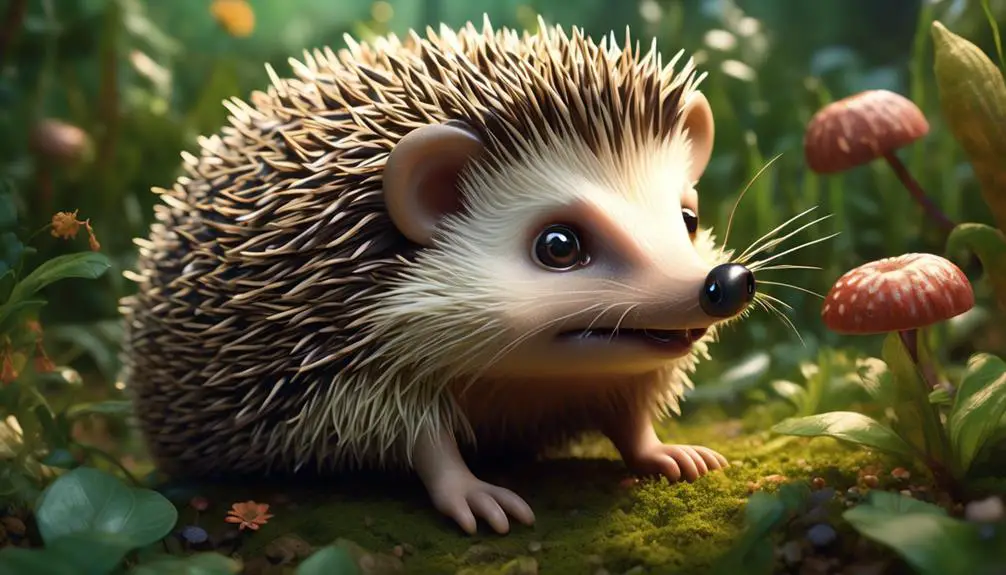
Do hedgehogs have a natural affinity for worms as part of their diet?
Hedgehogs are known to consume various types of food, including worms and other invertebrates. In the wild, hedgehogs prefer insects and plant-based food. However, they do eat different types of worms such as earthworms, silkworms, hookworms, and caterpillars. These worms provide necessary nutrients for hedgehogs to thrive.
When it comes to pet hedgehogs, it’s best to provide them with proper hedgehog food instead of worms and insects. Commercial hedgehog food is specifically formulated to meet their nutritional needs, ensuring they receive a balanced diet. Additionally, worms and insects from the wild may carry parasites that can harm pet hedgehogs.
Pigeons and Their Varied Diet
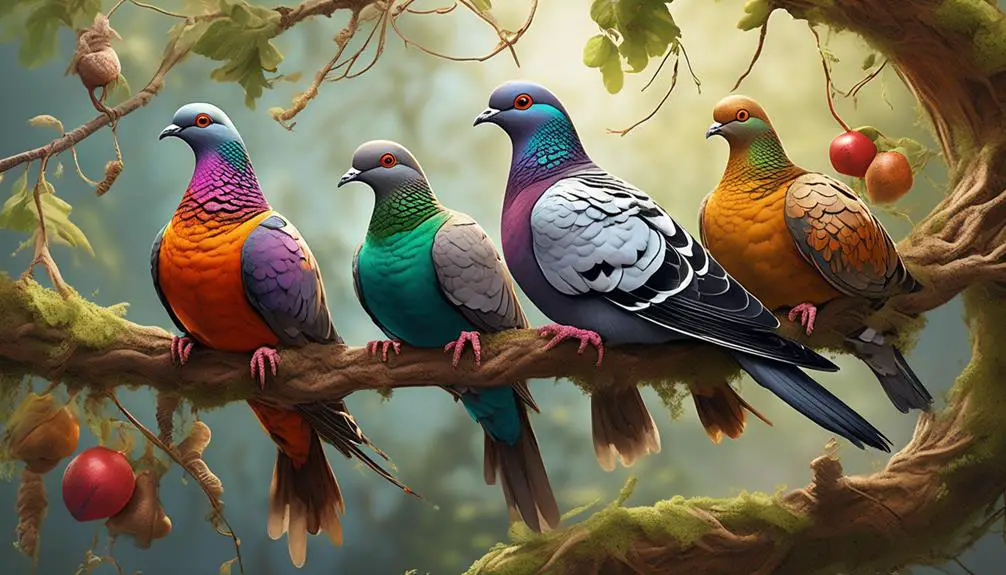
Pigeons exhibit dietary versatility, consuming a wide range of food including sunflower seeds, berries, fruits, and vegetables. While their diet primarily consists of plant-based food, pigeons are capable of consuming worms if they’re available. However, the consumption of worms by pigeons is more prevalent in rural areas where they’ve greater access to green spaces.
In urban environments, where pigeons primarily reside, their diet is often limited to plant-based sources due to the scarcity of worms. Nonetheless, when given the opportunity, pigeons can consume smaller worms that fit in their beak. This ability to adapt their diet to include worms highlights the adaptability and opportunistic nature of pigeons as feeders.
It is important to note that pigeons don’t solely rely on worms for their nutritional needs. They’ve evolved to thrive on a diverse range of food sources, allowing them to survive and thrive in various environments. This dietary versatility contributes to their widespread distribution and success as a species.
Chickens and Their Affinity for Earthworms
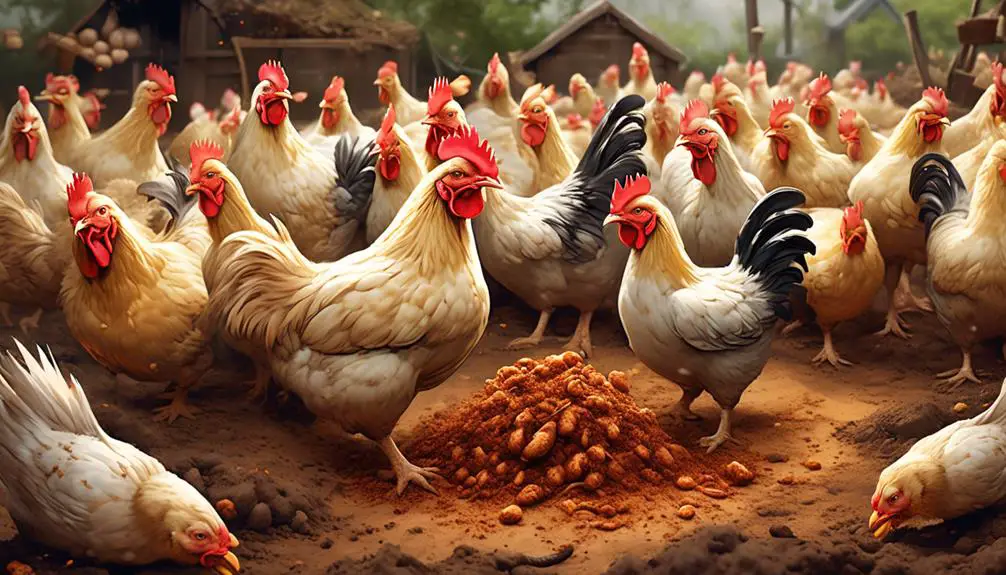
Chickens have a strong affinity for earthworms, as they’re a favorite food choice. Earthworms provide essential minerals and nutrients that contribute to the overall health and development of chickens, including the strengthening of their immune systems.
In chicken farming practices, earthworms are often included in their diet to ensure optimal nutrition and well-being.
Chicken Diet Preferences
Chickens, being avid foragers and natural hunters, have a strong affinity for earthworms and consider them a favored delicacy in their diet. Earthworms provide an excellent source of protein, essential amino acids, and minerals like calcium and phosphorus, which are crucial for the growth and development of chickens.
In addition to their nutritional value, earthworms also offer a natural source of enrichment for chickens, satisfying their instinctual need to hunt and peck. Chickens use their beaks to dig into the soil and uncover the worms, providing them with mental and physical stimulation.
The act of foraging for earthworms also helps to keep chickens occupied, preventing boredom and potential behavior problems. Therefore, incorporating earthworms into a chicken’s diet not only enhances their nutritional intake but also promotes their overall well-being.
Nutritional Benefits of Earthworms
Earthworms offer a multitude of nutritional benefits to avian species, such as chickens, due to their high protein content and essential amino acids. Chickens have a natural affinity for earthworms and enjoy eating them as a source of nourishment.
Earthworms are rich in protein, which is crucial for muscle development and repair in chickens. Additionally, earthworms provide essential amino acids that chickens require for overall growth and vitality. These amino acids play a vital role in various bodily functions, including the production of enzymes and hormones.
Furthermore, earthworms are a good source of minerals, such as calcium and phosphorus, which are essential for the formation of strong bones and eggshells in chickens.
Chicken Farming Practices
Chicken farming practices commonly focus on optimizing the nutritional intake and dietary preferences of these poultry birds. When it comes to chickens and their affinity for earthworms, it’s important to note that chickens love to eat earthworms as they’re a favorite food. Earthworms provide necessary nutrients for chickens to become healthy and develop robust immune systems.
In fact, poultry farmers often give chickens mealworms, slugs, and earthworms as part of their diet. This is because earthworms are a good source of minerals and other essential nutrients that chickens need for their overall well-being. So, it’s no wonder that chickens have a strong attraction to earthworms and find them to be a highly desirable food source.
Ducks and Their Omnivorous Nature

Ducks are highly adaptable and have an omnivorous diet, allowing them to consume a wide variety of food sources.
In their quest for sustenance, ducks readily include worms as part of their diet. Worms provide essential nutrients and contribute to the overall diversity of the duck’s diet, ensuring they receive a well-rounded nutritional intake.
Duck Diet Diversity
Ducks, being omnivorous creatures, possess a diverse diet that encompasses various types of food, including worms, as part of their natural feeding behavior. Ducks have a robust digestive system that allows them to digest different kinds of worms.
Poultry farmers often provide ducks with mealworms, slugs, and earthworms as part of their diet. In the wild, ducks rely on worms for necessary nutrients and to build their immune systems. Ducklings can also be given worms as part of their diet after they reach sixteen weeks of age.
This diverse diet ensures that ducks receive the necessary nutrients for their growth and overall health. The ability of ducks to consume worms highlights their adaptability and their role in maintaining a balanced ecosystem.
Worms as Duck Food
With their diverse diet encompassing various types of food, including worms, ducks demonstrate their adaptability and role in maintaining a balanced ecosystem.
Ducks, being omnivorous, have a strong digestive system that allows them to digest different types of worms. Poultry farmers often include mealworms, slugs, and earthworms in the diet of ducks to provide necessary nutrients.
In the wild, ducks rely on worms for essential nutrients and to build their immune systems. Ducklings can also be given worms as part of their diet after they reach sixteen weeks old.
Worms serve as a valuable food source for ducks, contributing to their overall health and well-being. By consuming worms, ducks play a crucial role in controlling worm populations and maintaining a harmonious ecosystem.
Possums as Opportunistic Feeders
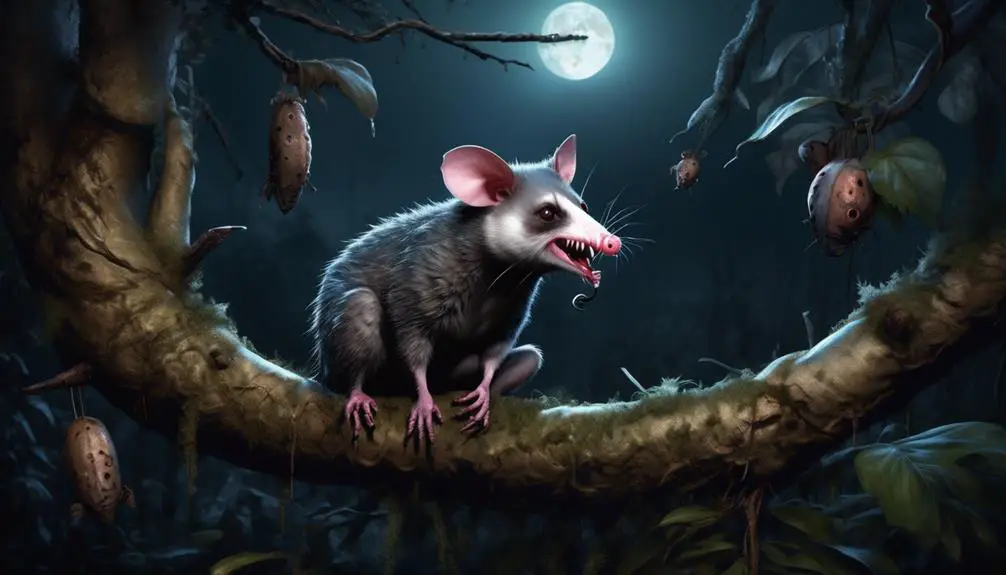
Possums, being opportunistic feeders, have a diverse diet that includes worms along with other animal-based food. These adaptable creatures are known to consume a variety of invertebrates, including worms, insects, snails, and slugs. They’re equipped with sharp teeth and strong jaws that allow them to efficiently capture and consume their prey.
Possums have a keen sense of smell, which helps them locate worms in the soil. They’re skilled climbers and can even venture into trees to find worms and other small animals. Possums are also known to scavenge for carrion, feeding on the remains of animals that have already died.
While worms are a valuable food source for possums, they aren’t solely dependent on them. These opportunistic feeders have the ability to adapt their diet to the available resources in their environment. This flexibility allows them to survive in various habitats, from forests to suburban areas.
In addition to worms, possums may also consume small mammals, birds, eggs, fruits, and plant material. Their diverse diet enables them to meet their nutritional needs and thrive in different ecosystems. However, it’s important to note that possums are primarily herbivores, with plant material making up a significant portion of their diet.
Frogs and Their Appetite for Worms

Frogs, known for their diverse diet, display a strong appetite for worms, including earthworms, mealworms, and bloodworms. Frogs belong to the order Anura and are amphibians found in various habitats worldwide. They’ve a specialized diet that typically consists of insects, small invertebrates, and sometimes small vertebrates. Worms, especially earthworms, are a common prey item for many frog species.
Earthworms are a staple food source for frogs. These slimy creatures are rich in protein and other nutrients, making them a nutritious meal for frogs. Frogs have a sticky tongue that they use to catch and swallow worms whole. They’ve a keen sense of vision and can spot worms moving on the ground or in water.
Mealworms and bloodworms are also favored by frogs. Mealworms are the larvae of darkling beetles, while bloodworms are the larvae of midges. These worms provide essential nutrients for frogs, including fats, proteins, and vitamins.
It is important to note that pet frogs should be fed carefully, avoiding wild worms that may carry parasites or be too large for the frog to consume. Instead, commercially-raised worms, specifically bred for reptiles and amphibians, are recommended.
Armadillos and Their Knack for Worm Hunting
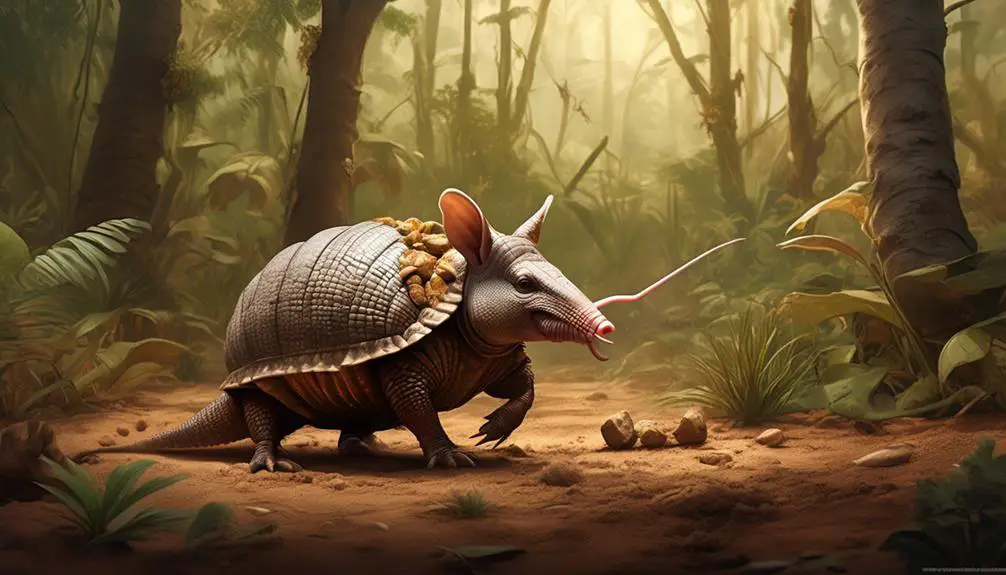
Armadillos, known for their burrowing abilities and keen sense of smell, have a remarkable knack for hunting and capturing worms in their natural habitats. These unique animals have adapted to their worm-hunting lifestyle by developing specialized techniques and physical attributes. With their sharp claws and strong forelimbs, armadillos can efficiently dig through the soil, exposing the hidden worms beneath. Their sensitive snouts, equipped with an impressive sense of smell, allow them to detect the presence of worms even before they start digging. Once a worm is detected, armadillos use their long tongues to quickly snatch and consume them.
Armadillos primarily feed on earthworms, which provide them with essential nutrients, including protein and carbohydrates. They’re particularly fond of large, juicy worms, as these provide a substantial meal. Armadillos’ ability to locate and capture worms is crucial for their survival, as these invertebrates make up a significant portion of their diet. Their knack for worm hunting enables them to sustain themselves in their natural habitats.
Armadillos’ burrowing abilities and keen sense of smell aren’t only advantageous for worm hunting but also for finding shelter and avoiding predators. These remarkable skills contribute to their overall survival and success as a species. Armadillos’ knack for worm hunting highlights the intricate relationships between animals and their food sources in the natural world.
Moles and Their Dependence on Earthworms
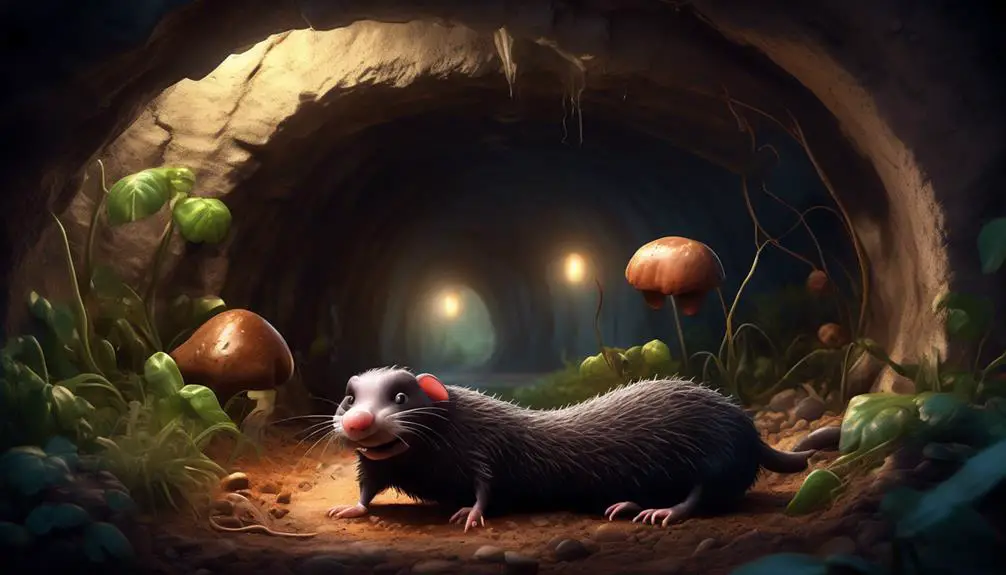
Moles, known for their subterranean lifestyle and specialized feeding habits, heavily rely on earthworms as a vital part of their diet. These small mammals have a strong dependence on earthworms due to their high nutritional value and abundance in the soil.
Moles possess a keen sense of smell, allowing them to locate earthworms underground with remarkable precision. They’re capable of eating their weight in worms every day, highlighting the importance of earthworms in their diet.
Earthworms provide moles with essential nutrients, including protein, fat, and carbohydrates, necessary for their growth, energy, and reproduction. The consumption of earthworms also helps moles maintain their health by providing them with vitamins, minerals, and other essential micronutrients.
Without a steady supply of earthworms, moles may struggle to meet their dietary requirements and may face adverse effects on their overall fitness and survival. Furthermore, moles play a significant role in regulating earthworm populations, as their feeding habits can impact the abundance and distribution of these soil-dwelling invertebrates.
Turtles and Their Reliance on Worms for Nutrients

Turtles rely on worms as an essential source of nutrients, playing a crucial role in their growth, development, and overall health. Worms provide turtles with the necessary protein, vitamins, and minerals they need to thrive. Let’s take a closer look at the specific nutrients that worms offer to turtles:
| Nutrient | Function in Turtles |
|---|---|
| Protein | Essential for growth and tissue repair |
| Calcium | Important for bone and shell development |
| Phosphorus | Assists in bone formation and energy storage |
| Iron | Necessary for the production of red blood cells |
| Vitamin E | Acts as an antioxidant and supports immune function |

Erzsebet Frey (Eli Frey) is an ecologist and online entrepreneur with a Master of Science in Ecology from the University of Belgrade. Originally from Serbia, she has lived in Sri Lanka since 2017. Eli has worked internationally in countries like Oman, Brazil, Germany, and Sri Lanka. In 2018, she expanded into SEO and blogging, completing courses from UC Davis and Edinburgh. Eli has founded multiple websites focused on biology, ecology, environmental science, sustainable and simple living, and outdoor activities. She enjoys creating nature and simple living videos on YouTube and participates in speleology, diving, and hiking.
- WILDLIFE THEMED T-SHIRTS
Cute Hedgehog Embroidered: Love Wildlife, Protect Nature Wildlife conservation tees
$35.00

